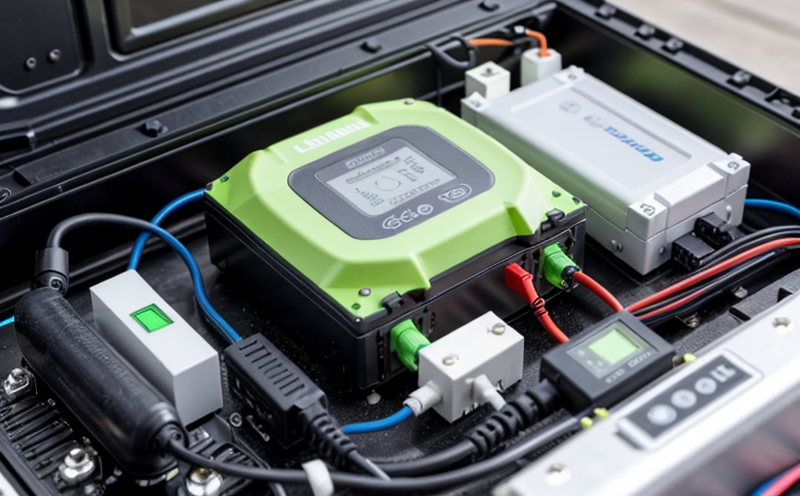UL 9540 Lithium-Ion Battery Testing for Energy Storage Systems
The UL 9540 standard is specifically designed to ensure the safety and reliability of lithium-ion batteries used in energy storage systems (ESS). This comprehensive testing protocol covers a range of critical aspects that are essential for safeguarding human life, property, and the environment. Compliance with UL 9540 is mandatory for manufacturers who wish to sell their products in the North American market.
UL 9540 addresses various hazards such as thermal runaway, short circuits, overcharging, and mechanical abuse. The standard requires that batteries undergo a series of rigorous tests including charge-discharge cycling, thermal stability testing, impact resistance testing, and more. These tests are conducted under controlled conditions to simulate real-world scenarios where the battery might encounter stress or abuse.
The testing process is highly technical and involves precise instrumentation and methodology. Each test aims at identifying potential weaknesses in the design and manufacturing of the lithium-ion batteries. For instance, thermal stability testing ensures that the battery can withstand extreme temperatures without catching fire or exploding. Charge-discharge cycling tests determine the longevity and performance consistency over a specified number of charge-discharge cycles.
During specimen preparation, it is crucial to follow UL 9540’s guidelines meticulously. This includes selecting batteries that are representative of those intended for commercial use. The batteries undergo various stages of pre-conditioning before being subjected to different tests. Proper labeling and documentation are also essential throughout the testing process.
The instrumentation used in these tests is state-of-the-art, designed to provide accurate and reproducible results. Key instruments include high-precision temperature sensors, advanced data acquisition systems, and sophisticated software for analyzing test outcomes. The use of such equipment ensures that every test result is reliable and can be validated by independent third parties.
Upon completion of all tests, comprehensive reports are generated detailing the performance of each battery under the specified conditions. These reports serve as a critical document that helps manufacturers understand their product’s limitations and areas for improvement. They also provide assurance to buyers about the safety and reliability of the batteries they purchase.
The importance of UL 9540 cannot be overstated, especially given the growing demand for energy storage systems in renewable energy applications like solar power and wind farms. By adhering to this standard, manufacturers can ensure that their products meet stringent safety requirements, thereby protecting consumers from potential hazards associated with lithium-ion batteries.
Eurolab Advantages
EuroLab offers unparalleled expertise in UL 9540 compliance testing for energy storage systems. Our team of highly qualified professionals brings extensive experience and knowledge to every test, ensuring that our clients receive accurate and reliable results.
- State-of-the-art facilities equipped with the latest technology
- Comprehensive understanding of current regulatory requirements
- Dedicated project managers for seamless coordination
- Prompt turnaround times without compromising on quality
- Accurate documentation and reporting services
- Support in navigating complex compliance issues
- Access to a global network of laboratories for international clients
We pride ourselves on providing personalized service tailored to the needs of our customers. Whether you are looking for one-time testing or ongoing support, EuroLab is committed to meeting your requirements with precision and efficiency.
International Acceptance and Recognition
- The United States and Canada
- The European Union (EU)
- Australia and New Zealand
- Japan
- China
UL 9540 is widely accepted across these regions due to its stringent safety standards. In the US and Canada, compliance with this standard is a legal requirement for selling lithium-ion batteries in the market. Similarly, it is recognized as an essential certification in Europe, where strict regulations govern the use of such batteries.
In Australia and New Zealand, UL 9540 is considered alongside other international standards to ensure the safety of energy storage systems. Japan has also adopted this standard as part of its broader efforts towards safer technology adoption. China, being a major player in the global market, follows similar practices to ensure product safety.
The recognition and acceptance of UL 9540 in these regions underscore its importance not just locally but globally. By adhering to this standard, manufacturers can easily penetrate international markets while maintaining high standards of quality and safety.
Use Cases and Application Examples
| Use Case/Scenario | Description |
|---|---|
| Solar Power Systems | Batteries used in solar power systems need to be tested for their ability to handle fluctuations in energy demand. UL 9540 ensures that these batteries can efficiently store and discharge energy without posing risks. |
| Wind Farm Energy Storage | Energy storage from wind farms must be reliable and safe. Testing under UL 9540 helps validate the performance of lithium-ion batteries in this context. |
| Data Centers | Batteries used in data centers need to ensure uninterrupted power supply during outages. UL 9540 tests help verify that these batteries meet the necessary safety and performance criteria. |
| Electric Vehicle Charging Stations | The energy storage systems at EV charging stations require robust testing to prevent failures that could lead to accidents or environmental hazards. |
| Rooftop Solar Systems | Batteries in rooftop solar installations must be tested for their ability to handle the unique stresses of this environment. UL 9540 provides a framework for ensuring such batteries are safe and reliable. |
These examples illustrate how UL 9540 plays a crucial role in various sectors, from renewable energy to data centers, by ensuring the safety and reliability of lithium-ion batteries used in ESS. This standard helps to build trust among consumers, stakeholders, and regulatory bodies.





